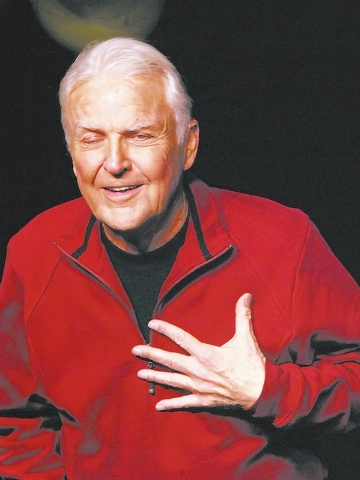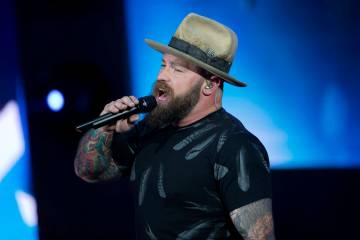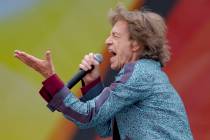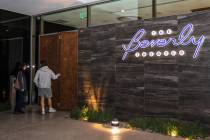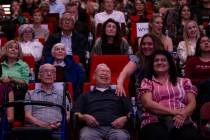Actor Anthony Zerbe will offer look at cleverly idiosyncratic works of E.E. Cummings
mention e e cummings to most people and theyll think if they think of anything at all of the poets idiosyncratic use of punctuation capitalization and grammar which if nothing else makes him perhaps the spiritual godfather of todays mobile phone texters
Well, that’s going to be annoying. So, we’ll switch back to our more usual mode of writing to note that beyond the visible typographical quirks of E.E. Cummings’ writing can be found, Anthony Zerbe suggests, great compassion, clever wordplay, a fascinating cast of characters and a unique way of looking at the world.
On Friday, Southern Nevadans can enjoy the actor reading, performing and reveling in the poetry and prose of E.E. Cummings in his one-man play, “It’s All Done With Mirrors: The Poetry and Prose of E.E. Cummings.”
The play, a prefestival event of the Vegas Valley Book Festival, will begin at 7:30 p.m. at the Historic Fifth Street School, 401 S. Fourth St. Tickets are $10 in advance and $15 at the door. For tickets and more information, visit www.artslasvegas.org or call 702-229-3515.
During a phone interview this past week, the award-winning character actor — who, by the way, has no problem at all with that descriptive, but more on that later — offers the event “isn’t a poetry reading.”
Rather, Zerbe suggests, “it’s a sharing, put it that way.”
And, he adds with a laugh, “nobody is going to be tested on Friday night.”
“The genesis of the show is that I started reading Cummings as a young man,” Zerbe says, often between movie or TV takes or breaks during play rehearsals.
Zerbe found himself intrigued by Cummings’ wordplay, the colorful characters he created and the poet’s love of the natural world.
Cummings, Zerbe says, also was a poet who was willing to “play with language,” inspired at least in part by “hearing people talk and going to the other side of the tracks and hearing a lot of language used very colorfully and very spontaneously.”
Cummings’ experimentation and playfulness also would come to be reflected “a lot on the page,” Zerbe says. “He was an artist so he, for example, never titled his poems. No poem of his ever had a title. The first line of every poem is how you find the poem.”
And, of course, there’s that memorably idiosyncratic typography.
“Some people say the capital (key) was out on his typewriter,” Zerbe says. “I don’t know whether that’s apocryphal or not.”
So what makes Cummings so appealing? “Just his compassion,” Zerbe answers.
And, beyond that, maybe it’s best to not overanalyze things.
“You know, everybody wants to identify things about a poet or about a playwright,” Zerbe says. “They want to codify something or put it in terms that can be understood. We want to understand something, because that’s how our minds work. We like to understand things, and it’s discomfiting if we don’t understand things.
“All of this is a hideous way of getting to the point that I don’t know what I get out of Cummings. I can tell you he means a lot to me, and I think he says a lot.”
“Everybody kind of gets what they get out of something,” Zerbe says. “And I think with Cummings, he was just all about individuality and our individualism and the rights of the individual. Particularly for the artist, it’s crucial that you find yourself, or that aspect of yourself, that is not anybody else.”
How does Zerbe transform Cummings’ poetry into performance?
“Performance is a nebulous thing,” he answers. “It’s just one guy sharing poetry with some people.”
He laughs. “An old guy,” he adds, “just hearing some good ideas.”
Actually, when settling in for an evening of poetry-inspired entertainment, it would be hard to find a more enthusiastic guide. In talking with Zerbe, it seems impossible to happen upon an artistic discipline that he’s not passionate about. During the course of a too-quick 20 minutes, he talks about his love of poetry and contemporary fiction, his admiration for a few choice cable TV series and the impressive quality of many of the young actors whose work he has seen.
Then there’s Zerbe’s admission that he hates for a good novel to end and that he’ll sometimes ratchet back his reading speed to prolong reaching the story’s inevitable conclusion. (Conversely, Zerbe admits that in the case of one best-selling novel, he found himself reading more quickly because “I thought if I started reading faster, (the protagonist) wouldn’t get killed.”)
He confesses to a love of Cormac McCarthy’s work and says that, when the author has released new books, “I’ve gone to the bookstore the night before the book was supposed to be presented and tried to cajole the clerk into selling me a copy.”
He laughs. “I know they’re back there. I know they’re all stacked there. I’ll tell the clerk, ‘I’ll give you double the money.’ In one instance, a guy said, ‘You don’t need to do that. I’ll just give it to you,’ and the other guy wouldn’t budge.”
Or, take, even, the time he sent a literary mash note to Elizabeth Gilbert, author of “Eat, Pray, Love: One Woman’s Search for Everything Across Italy, India and Indonesia,” complimenting her on her own audiobook reading of it.
“Her reading of it was impeccable, and I felt when I gave it up, I gave her up. I wrote her a little email and I said: ‘What am I supposed to do now? What did I do to offend you? You’re just out of my life. No nothing, no goodbye,’ ” Zerbe says with a laugh.
And what about his own impressive career, which includes work on some of the best TV series of the ’60s, ’70s and beyond (Zerbe won an Emmy award for his work in “Harry O,” the David Janssen detective series that some fans of the genre consider one of its best), memorable parts in such films as “Cool Hand Luke,” “Papillon,” “They Call Me Mister Tibbs!” and “The Omega Man,” and a raft of theater productions?
Zerbe will talk about all that, too, although one gets the sense that he finds talking about other people’s artistic endeavors way more fun.
So: He’s OK with being referred to as a “character actor”?
“Oh, totally,” Zerbe answers with a laugh. “When (Robert) Redford was around, I was not going to be a leading man.”
And how does one assemble such an eclectic and diverse body of work?
“Making a living had something to do with it,” Zerbe says. “Also, loving the theater. I really love being onstage — that’s kind of home base — but I love the camera, too. I love it all.”
While in Las Vegas, Zerbe is scheduled to conduct a class for University of Nevada, Las Vegas theater students. It’s something he does wherever he goes.
“I give talks to theater arts departments, and I don’t know what I’ll say. I don’t plan a thing,” Zerbe says. “It’s just the energy of these young people. They’re the next generation, and what they have is very representative of how I felt when I was 19 or 20 or so. I’m really happy to be with them.”
Zerbe also teaches two months each year at the Stella Adler Studio of Acting in New York City.
“She was my teacher,” he says, “so it’s nice to give something back.”
Zerbe is told that it’s great that he seems to be so passionate about the arts.
“Well, the arts keep me alive,” he says.
Maybe even in ways beyond the metaphorical. Zerbe is so well-blessed with the ability to portray mean and scary characters that, he jokes, his work may have helped to make him “mug-proof.”
“I’ve played so many bad guys,” he says with a laugh, “that, eventually, some guy who’s going to mug me, he just thinks, ‘This doesn’t feel right. I’m going to let this guy go … ’ ”
Contact reporter John Przybys at jprzybys@reviewjournal.com or 702-383-0280.
If you go ...
What: Anthony Zerbe in "It’s All Done With Mirrors: The Poetry and Prose of E.E. Cummings"
When: 7:30 p.m. Friday
Where: Historic Fifth Street School, 401 S. Fourth St.
Tickets: $10 advance, $15 at the door (www.ArtsLasVegas.org or 702-229-3515)



